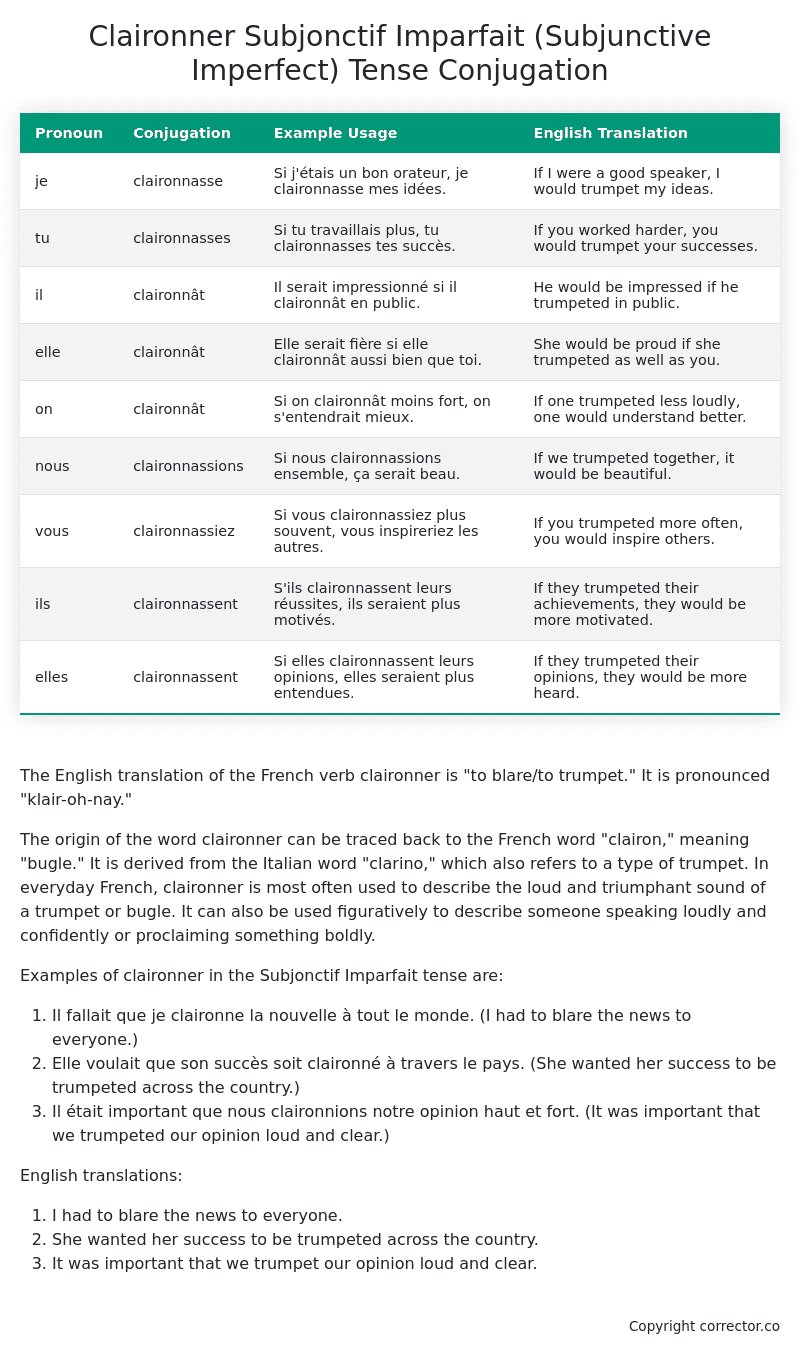Subjonctif Imparfait (Subjunctive Imperfect) Tense Conjugation of the French Verb claironner
Introduction to the verb claironner
The English translation of the French verb claironner is “to blare/to trumpet.” It is pronounced “klair-oh-nay.”
The origin of the word claironner can be traced back to the French word “clairon,” meaning “bugle.” It is derived from the Italian word “clarino,” which also refers to a type of trumpet. In everyday French, claironner is most often used to describe the loud and triumphant sound of a trumpet or bugle. It can also be used figuratively to describe someone speaking loudly and confidently or proclaiming something boldly.
Examples of claironner in the Subjonctif Imparfait tense are:
- Il fallait que je claironne la nouvelle à tout le monde. (I had to blare the news to everyone.)
- Elle voulait que son succès soit claironné à travers le pays. (She wanted her success to be trumpeted across the country.)
- Il était important que nous claironnions notre opinion haut et fort. (It was important that we trumpeted our opinion loud and clear.)
English translations:
- I had to blare the news to everyone.
- She wanted her success to be trumpeted across the country.
- It was important that we trumpet our opinion loud and clear.
Table of the Subjonctif Imparfait (Subjunctive Imperfect) Tense Conjugation of claironner
| Pronoun | Conjugation | Example Usage | English Translation |
|---|---|---|---|
| je | claironnasse | Si j’étais un bon orateur, je claironnasse mes idées. | If I were a good speaker, I would trumpet my ideas. |
| tu | claironnasses | Si tu travaillais plus, tu claironnasses tes succès. | If you worked harder, you would trumpet your successes. |
| il | claironnât | Il serait impressionné si il claironnât en public. | He would be impressed if he trumpeted in public. |
| elle | claironnât | Elle serait fière si elle claironnât aussi bien que toi. | She would be proud if she trumpeted as well as you. |
| on | claironnât | Si on claironnât moins fort, on s’entendrait mieux. | If one trumpeted less loudly, one would understand better. |
| nous | claironnassions | Si nous claironnassions ensemble, ça serait beau. | If we trumpeted together, it would be beautiful. |
| vous | claironnassiez | Si vous claironnassiez plus souvent, vous inspireriez les autres. | If you trumpeted more often, you would inspire others. |
| ils | claironnassent | S’ils claironnassent leurs réussites, ils seraient plus motivés. | If they trumpeted their achievements, they would be more motivated. |
| elles | claironnassent | Si elles claironnassent leurs opinions, elles seraient plus entendues. | If they trumpeted their opinions, they would be more heard. |
Other Conjugations for Claironner.
Le Present (Present Tense) Conjugation of the French Verb claironner
Imparfait (Imperfect) Tense Conjugation of the French Verb claironner
Passé Simple (Simple Past) Tense Conjugation of the French Verb claironner
Passé Composé (Present Perfect) Tense Conjugation of the French Verb claironner
Futur Simple (Simple Future) Tense Conjugation of the French Verb claironner
Futur Proche (Near Future) Tense Conjugation of the French Verb claironner
Plus-que-parfait (Pluperfect) Tense Conjugation of the French Verb claironner
Passé Antérieur (Past Anterior) Tense Conjugation of the French Verb claironner
Futur Antérieur (Future Anterior) Tense Conjugation of the French Verb claironner
Subjonctif Présent (Subjunctive Present) Tense Conjugation of the French Verb claironner
Subjonctif Passé (Subjunctive Past) Tense Conjugation of the French Verb claironner
Subjonctif Imparfait (Subjunctive Imperfect) Tense Conjugation of the French Verb claironner (this article)
Subjonctif Plus-que-parfait (Subjunctive Pluperfect) Tense Conjugation of the French Verb claironner
Conditionnel Présent (Conditional Present) Tense Conjugation of the French Verb claironner
Conditionnel Passé (Conditional Past) Tense Conjugation of the French Verb claironner
L’impératif Présent (Imperative Present) Tense Conjugation of the French Verb claironner
L’infinitif Présent (Infinitive Present) Tense Conjugation of the French Verb claironner
Struggling with French verbs or the language in general? Why not use our free French Grammar Checker – no registration required!
Get a FREE Download Study Sheet of this Conjugation 🔥
Simply right click the image below, click “save image” and get your free reference for the claironner Subjonctif Imparfait tense conjugation!

Claironner – About the French Subjonctif Imparfait (Subjunctive Imperfect) Tense
Formation
Common Everyday Usage Patterns
Interactions with Other Tenses
Subjonctif Présent
Indicatif Passé Composé
Conditional
Conditional Perfect
Summary
I hope you enjoyed this article on the verb claironner. Still in a learning mood? Check out another TOTALLY random French verb conjugation!


